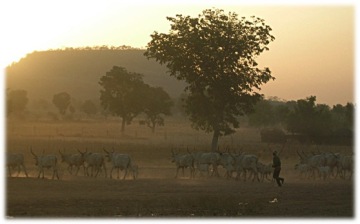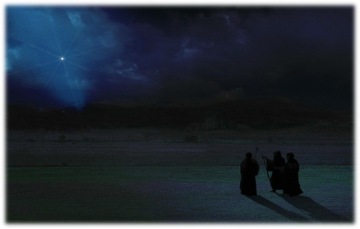After numerous requests, Linda Kohanov will offer a three-day experiential version of her well-received one-day indoor  seminar The Shepherd’s Task. This workshop, which will take place January 30 through February 1, 2015, will explore the compassionate, visionary approach to leadership, service, and conflict resolution that she developed, in part, from studying traditional pastoral cultures, where shepherds learn to gentle aggressive herd members and stand up to predators, while nurturing all the tribe’s animals, keeping them from straying, fighting, or getting hurt.
seminar The Shepherd’s Task. This workshop, which will take place January 30 through February 1, 2015, will explore the compassionate, visionary approach to leadership, service, and conflict resolution that she developed, in part, from studying traditional pastoral cultures, where shepherds learn to gentle aggressive herd members and stand up to predators, while nurturing all the tribe’s animals, keeping them from straying, fighting, or getting hurt.
“This knowledge, as it applies human ‘herds,’ is emphasized throughout the Bible,” Linda says, “though it was downplayed when Christianity and Judaism were both absorbed by city-based cultures. Through studies of traditional pastoral cultures and twenty years experience with my own herd of horses, I began to see a deeper wisdom in biblical references to shepherds and their flocks that has been virtually lost by modern civilization–and yet remains key to understanding many of the skills Jesus in particular was not only modeling, but modifying in order to shift the abusive practices of the conquest-oriented, intensely hierarchical, sedentary Roman culture of his time.”
The Shepherd’s Task (click here for workshop description) is for anyone seeking a refreshing, innovative approach to the advanced leadership, emotional and social intelligence principles modeled by the founder of Christianity (though not always by his followers). Through safe yet profound ground activities with the Eponaquest herd, this workshop provides useful skills for clergy, spiritual counselors, and church members as well as people who are curious about Jesus’ relevance to modern life. Those who’ve felt disconnected or disillusioned by the Christian faith they grew up with have also been inspired and renewed by previous versions of this seminar, as have non-Christians who’ve always wondered about Jesus’ social and cultural significance.
 “Jesus actively reinforced a peaceful yet powerful, nonpredatory philosophy at one of the most brutal times in history,” Linda emphasizes. “He also demonstrated the effectiveness of an open-hearted, compassionate form of heroism in creating cultural and spiritual transformation. Regardless of your religious orientation, it is truly enlightening to look at Jesus as a social innovator who introduced advanced principles that are especially relevant for people today.”
“Jesus actively reinforced a peaceful yet powerful, nonpredatory philosophy at one of the most brutal times in history,” Linda emphasizes. “He also demonstrated the effectiveness of an open-hearted, compassionate form of heroism in creating cultural and spiritual transformation. Regardless of your religious orientation, it is truly enlightening to look at Jesus as a social innovator who introduced advanced principles that are especially relevant for people today.”
In this effort, Linda takes an insightful, unprecedented look at Jesus’ approach to power, leadership, community building and compassionate social activism, showcasing ten skills he modeled that “were so sophisticated civilization is still trying to catch up.”
“This transformational workshop gave me a new perspective on Christianity,” says Janet Hogue, who attended the Portland, Oregon presentation of The Shepherd’s Task in 2013. “Instead of focusing on the death and resurrection of Jesus, she focused on his life and the leadership he was modeling for us. Insights from her book, The Power of the Herd, plus the historical context contrasting the cultures of the nomadic tribes from which Jesus descended, with the brutality of Rome, brought new meaning to the Christian stories. She outlined specific steps to building Emotional Heroism, the ultimate lesson Jesus embodied, providing a framework for understanding and improving both my personal and professional relationships.
“Old ideas, made new, seemed to almost click into comprehension for me. I can’t recommend it highly enough.”
A Bit of History
In sharing the pastoral roots of the Judeo-Christian heritage with tens of thousands of readers in several of her books, Linda attracted a number of ministers, priests and spiritual directors who came to Arizona to study her work in depth as a means of bringing greater power, vibrancy, and practical community building skills to their congregations. At the same time, these insights captivated people who had previously rejected the Christian faith they grew up with, inspiring them to engage more meaningfully with Jesus as an innovator who faced incredible challenges to introduce a new form of emotionally and socially intelligent leadership—at one of the most violent times in history. As a result of this growing interest, Linda created a one-day indoor workshop called The Shepherd’s Task that she first took on the road in 2013, presenting it in Oregon, Minnesota, Ohio and Texas.
“In this age of the debate over the relevancy of the Christian church, Linda brings us to a realization that what Jesus so profoundly modeled over 2000 years ago is brick and mortar for refreshing our foundation,” says Lauren Loos, MA, a counselor who attended and helped organize the very first Shepherd’s Task workshop in Portland, Oregon. “The Shepherd’s Task provided me with an innovative and refreshing answer to the question: How do I follow Jesus? She showed me something that years of study failed to reveal. That two thousand years ago, Jesus modeled a way of being and leading that exuded compassion, mutual respect, spiritual depth and reverence for all life in a way that I can strive toward in the 21st century.”
Many people who attended the initial, one-day indoor workshop format wanted more, with requests leading Linda to create a multi-day experiential version with horses that she will offer for the first time January 30 through February 1, 2015 at her equine-facilitated learning center in Amado, Arizona.
“I was raised in the Methodist church and found much inspiration in the nonviolent philosophy Jesus introduced to a troubled world,” Linda explains. “Yet even as a child, I felt that the aggressive behavior some Christians engaged in, especially under stress, was completely at odds with this profound tradition. The incongruent actions of a certain percentage of Christians throughout history, however, began to make sense when I realized how this innately peaceful yet still revolutionary religion was absorbed by the highly predatory Roman culture that Jesus fully intended to transform. Our culture became much less brutal as a result, but some practicing Christians still unconsciously engage in behavior reminiscent of Western civilization’s predatory, conquest-oriented roots.
“The transformation Jesus and his early followers jump-started is clearly not complete: Society is still evolving out of the oppressive dominance-submission system that reached its pinnacle in the Roman Empire two thousand years ago. In a section on religious leaders in The Power of the Herd, I showed the significant progress Jesus did make, but there’s still much work to be done. Many of his perspectives and practices are relevant, arguably essential, in creating social change, but they are difficult to fully understand and activate unless you access the nonpredatory, pastoral wisdom behind them. When skeptics see some Christians unconsciously shifting back and forth between the callous predatory-dominant behavior endemic to our culture’s conquest-oriented roots and the nonpredatory power and wisdom Jesus introduced, the credibility of the entire religion is questioned. This intensely incongruent behavior also causes some people raised in the church to not only reject their spiritual heritage, but to reject the very idea that there is a spiritual dimension to life.”
Because Linda’s multi-disciplinary approach to research and writing sometimes involves addressing spiritual and shamanic traditions from around the world, people often ask her about her personal beliefs.
“I’m a strong supporter of freedom of religion,” she says, “but for me, that freedom not only involves the ability to choose one, but the ability to learn from all wisdom traditions, to put them into their historical and cultural contexts, and see what is relevant in helping our now global society adopt a more peaceful, compassionate, mutually supportive orientation. In  this respect, I have learned much from tribal cultures as well as Buddhism and Taoism, two eastern religions that also have a nonpredatory orientation. And yet I find that some people who turn to Buddhism, Taoism, shamanism, and other religious or secular sources of insight and inspiration completely reject the paradigm-shifting wisdom of Christianity for the reasons I just mentioned.
this respect, I have learned much from tribal cultures as well as Buddhism and Taoism, two eastern religions that also have a nonpredatory orientation. And yet I find that some people who turn to Buddhism, Taoism, shamanism, and other religious or secular sources of insight and inspiration completely reject the paradigm-shifting wisdom of Christianity for the reasons I just mentioned.
“It’s vitally important to tease apart the misuse of Christianity (as an oppressive, holier-than-thou justification for conquest and social control) from the nonpredatory, socially intelligent, at times arguably shamanic, dimensions of Jesus’ life. Separating the exploitive misapplication of this religion from the as-yet-untapped potential of its founder’s message allows people to benefit from Jesus’ revolutionary ideas and practices, regardless of religious upbringing.
“It pains me to see how the abusive, judgmental, fear-mongering behavior of some people who call themselves Christians has obscured the still innovative wisdom that Jesus embodied. I’ve had profound spiritual experiences in nature, with horses, with music—and also in churches of various denominations. To me, they are all connected. But it is precisely because I’ve been open to other spiritual traditions that I’ve found some key aspects of Jesus’s life and message that are simply not accessible in any other religion, keys to creating a better life for everyone on this planet.”
This workshop offers practical techniques for handling interpersonal challenges at home, work, church, school, and in political/social activism contexts. You will learn how to engage compassionately with others while holding them accountable for unproductive behavior, exploring positive alternatives to interactions that normally result in shame, blame, retaliation and disempowerment. You will also learn how to develop the “emotional heroism” needed to handle challenging situations and open your heart to love, calling and service.
“The Roman Empire was one of the most violent cultures the world has known,” says Bill Couch, Senior Pastor at Lake Ridge United Methodist Church, who hosted a one-day indoor version of The Shepherd’s Task at his Lubbock, Texas-based church last spring. “In the midst of this violence, Jesus taught and lived a nonpredatory lifestyle. The Roman world collapsed, but the life of Jesus continues to impact our world today. Linda integrates biblical truth, equine wisdom and psychological insights to demonstrate how the way of Jesus brings healing and hope to our fractured and predatory world today. As a shepherd leader, Jesus combined power with compassion, courage with self-control and accountability with forgiveness. Applying these principles will transform your life, your home, your church, your business and the world! I encourage you to invest some time with Linda exploring The Shepherd’s Task. You will leave inspired and equipped to become a more effective leader.”
To register: http://eponaquest.com/workshop-registration/